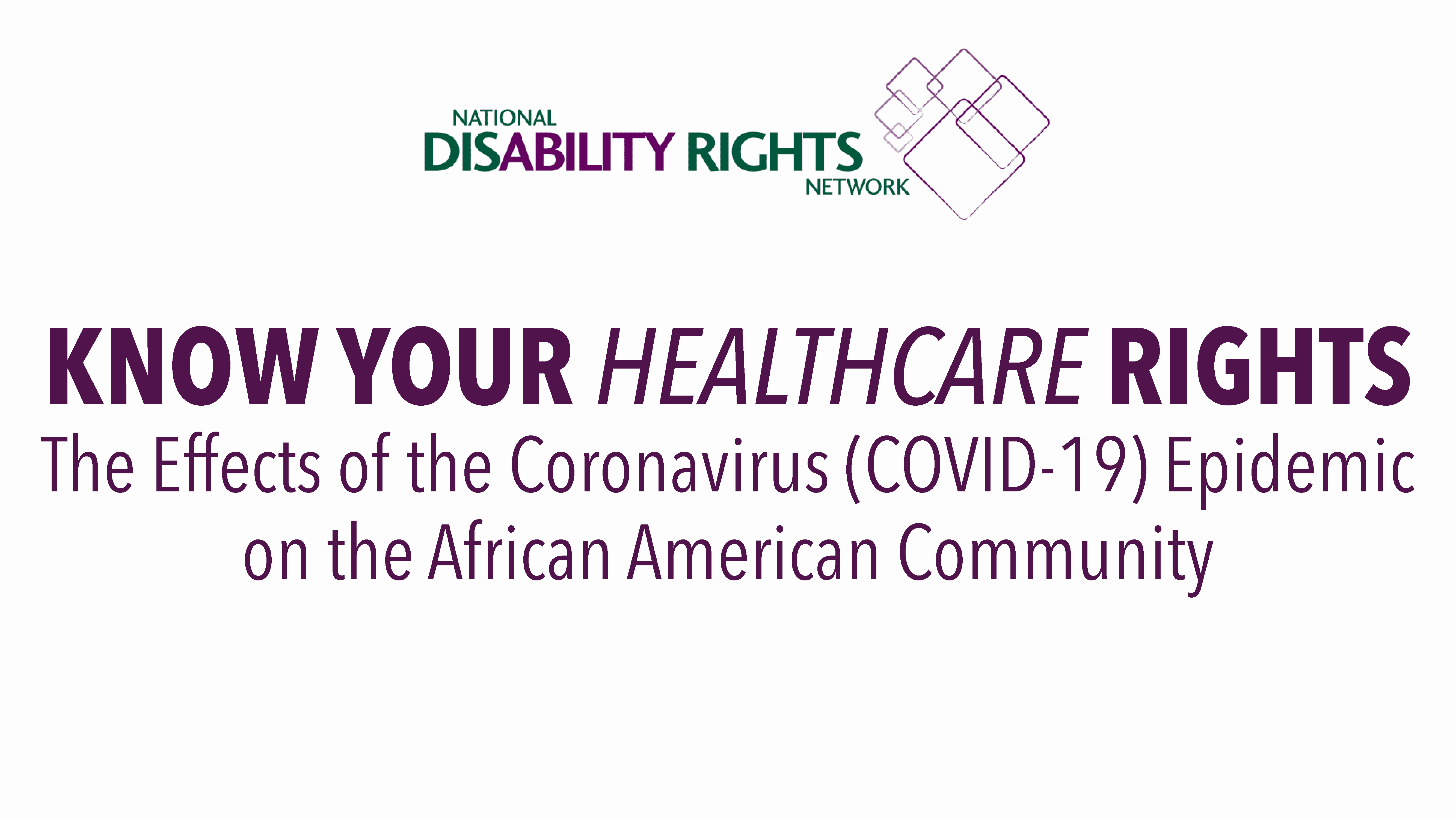The COVID-19 pandemic is impacting every community in the nation. Shuttering schools and workplaces, slowing public transportation, and delaying community-based services. In this series of videos, the National Disability Rights Network explains what your rights are and what you can do if you believe your rights are being violated. We hope this series will help to strengthen self-advocacy, address racial inequities, and protect the rights/lives of people with disabilities.
Black people with disabilities have the right to access healthcare! COVID-19 is disproportionately impacting communities of color nationwide. Miriam Heard, Senior Attorney at the National Health Law Program, helps us unpack healthcare inequities that particularly affect the Black community. Check out her video message for a few tips on advocating for greater access to healthcare coverage during the Coronavirus pandemic.
Download the following resource in Word.
I. African-American coronavirus death rates are alarmingly disproportionate with their representation in the population. [1]
II. Disproportionate death rates are attributable to longtime health care disparities in African American communities that have exacerbated the effects of the virus.
- Decades of segregation has relegated people of color into crowded, urban areas that often have substandard housing and limited access to green spaces and healthy food options. [2]
- As a result of systemic inequities, there are higher rates of chronic health conditions such as asthma, heart disease, and diabetes in communities of color. [3] These chronic conditions can make coronavirus more dangerous for African Americans.
- Social distancing guidelines are harder for people of color to follow since they are overly represented in service industry jobs, more likely to rely on public transportation, and less likely to have the option of working from home. [4]
- African Americans are less likely to be insured and that makes it more challenging for them to access COVID-19 testing and treatment.
III. It is crucial to gain access to health care to make it easier to access testing and treatment.
- For persons who have lost employer-based health insurance when they lost their jobs, the ACA extends a 60-day special enrollment period outside of open enrollment period to sign up for insurance plans and subsidies. Go to Healthcare.gov to learn more.
- Healthcare.gov is a good starting point to find the Medicaid agency in your state. If you are uninsured and think you might be eligible – apply for Medicaid.
IV. Know Your Medicaid rights
- When a state agency decides to deny your Medicaid application or to terminate or reduce Medicaid benefits, you must be given notice and a hearing.
- The notice must tell you what adverse action was taken in your case, why it was taken, and how you can appeal that decision.
- Appeal by or before the deadline given on your notice, and request a hearing.
- The hearing allows you to present witnesses and evidence to explain why the decision regarding your Medicaid was erroneous.
[1] The Atlantic, Why Don’t We Know Who the Coronavirus Victims Are?, April 1, 2020 https://www.theatlantic.com/ideas/archive/2020/04/stop-looking-away-race-covid-19-victims/609250/
[2] Center for American Progress, Coronavirus Compounds Inequality and Endangers Communities of Color, March 27, 2020 https://www.americanprogress.org/issues/race/news/2020/03/27/482337/coronavirus-compounds-inequality-endangers-communities-color/
[3] Center for American Progress, Coronavirus Compounds Inequality and Endangers Communities of Color, March 27, 2020 https://www.americanprogress.org/issues/race/news/2020/03/27/482337/coronavirus-compounds-inequality-endangers-communities-color/
[4] Center for American Progress, Coronavirus Compounds Inequality and Endangers Communities of Color, March 27, 2020 https://www.americanprogress.org/issues/race/news/2020/03/27/482337/coronavirus-compounds-inequality-endangers-communities-color/
<< Return to Know Your Rights during COVID-19 Series main page

